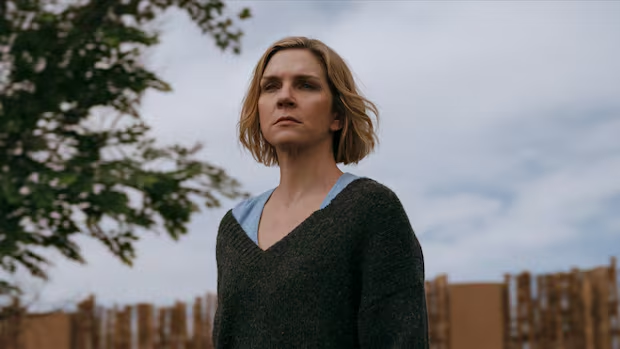How Pluribus turns the zombie genre into a philosophical masterpiece

Listen to this article
Estimated 5 minutes
The audio version of this article is generated by text-to-speech, a technology based on artificial intelligence.
Breaking Bad and Better Call Saul fans have long awaited a new show from creator Vince Gilligan. Finally, they have Pluribus.
The show follows Carol, who is immune to a disease that has killed much of the world or turned them into cheerful zombies. Despite the zombies constantly trying to help her, Carol remains a curmudgeon and refuses to join them.
Pluribus has only dropped its first two episodes on Apple TV, but has already garnered much critical acclaim for its philosophical and thought-provoking episodes around topics such as AI, happiness and herd mentality.
Today on Commotion, host Elamin Abdelmahmoud speaks with TV critics Jackson Weaver and Kathryn VanArendonk about Pluribus and why they love it.
We’ve included some highlights below, edited for length and clarity. For the full discussion, listen and follow Commotion with Elamin Abdelmahmoud on your favourite podcast player.
WATCH | Today’s episode on YouTube:
Elamin: There’s a lot of hype going into this show and its existence. This is a show from Vince Gilligan, this is the guy who created Breaking Bad and created Better Call Saul. Then this new show arrives. Does it live up to the hype?
Jackson: Yes! It’s a simple answer: absolutely.
There was so little given out about this show, while there was so much hype built up around it. It was the perfect recipe for: it doesn’t meet expectations, we’ve gassed it up too much, there’s no way it can live up to the hype. It absolutely does. I think it’s because, in some way, it’s very Vince Gilligan-y in how he tells stories: the absurd humour, having it in Albuquerque. But in other ways, it’s so different than anything else he’s ever done before.
Kathryn: [At first] you were like, “OK, this is a zombie show. I get it. I understand zombie shows.” It’s an infection and she doesn’t get infected for some reason. I’ve seen The Last of Us. I know about that one.
Then you’re like, “Wait, but the zombies seem nice. They want to make sure she’s got everything she needs. They’re happy to provide her with whatever she wants.” And then you start to think, “Oh, maybe this show is doing something quite different.”
Elamin: The thing that drew me to the show is this immediate distinction between agency and willingness to just be a grump, someone who’s having a bit of a hard time dealing with the world. And everyone around you being like, “Whenever you’re ready, we’re here to help.” And you finding that not to be a generous invitation, but the most oppressive thing in the world…. As an idea, to me, that’s really ambitious.
So there’s a lot of things in this show that feel very classic Vince Gilligan, but also that was a really big surprise. Kathryn, what stands out for you in terms of what you expect from a Vince Gilligen show, but also what you’re like, “Oh, the core tensions of the show that are actually very different than what I thought it was gonna get”?
Kathryn: The thing that I find really helpful to remember is that although we know Vince Gilligan best from Breaking Bad, he started as an X-Files writer. And this show, it makes so much sense coming out of that early formative experience of a show that is often about creating a speculative premise.
The speed that [Pluribus] sets up this whole world in that first episode, I think would be really disorienting for a lot of similar shows. If you think again about something like The Last of Us, where you get this world thing and then they’re like, “Episode two, we’re gonna go back and we’re going to tell you how we got here.” And I’m like, “I don’t care how we get here. I’m already here.”
This show is very much like, “Great, we are here now, let’s go for it.” The process of it afterwards is what [Gilligan] is so fascinated by and what I find so compelling also. Because it’s like, OK, if the zombies are good — or are they good? And what are they doing with all of the corpses that are lying everywhere? And how are they using energy? And what do they eat? And all of these questions. This is what this show is much more interested by, than like, “Oh no, it’s the apocalypse.”
You can listen to the full discussion from today’s show on CBC Listen or on our podcast, Commotion with Elamin Abdelmahmoud, available wherever you get your podcasts.
Panel produced by Ty Callender and Simi Bassi.




![Jackson Dean’s Playlist Will Definitely Surprise You [EXCLUSIVE]](https://cdn1.emegypt.net/wp-content/uploads/2025/11/Jackson-Deans-Playlist-Will-Definitely-Surprise-You-EXCLUSIVE-2-390x220.webp)
